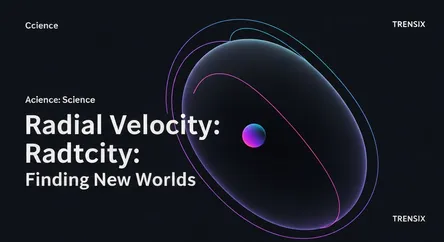Science
Radial Velocity: Finding New Worlds

Discover the radial velocity method, a key technique using the Doppler effect to find distant exoplanets by observing tiny stellar 'wobbles'.
What is it?
Radial velocity is the speed of an object moving toward or away from an observer. In astronomy, it's a crucial method for detecting exoplanets. As a planet orbits a star, its gravity makes the star 'wobble' slightly. This movement alters the star's light that reaches Earth, causing a shift in its spectrum—a phenomenon known as the Doppler effect. When the star moves towards us, its light is blueshifted; when it moves away, it's redshifted. By measuring these tiny shifts, astronomers can calculate the star's radial velocity, confirm the presence of an orbiting planet, and even estimate its mass.
Why is it trending?
The radial velocity method, or Doppler spectroscopy, remains a cornerstone of exoplanet science. With thousands of exoplanets now discovered, this technique is responsible for many of the earliest and most significant finds. It continues to be vital for confirming planet candidates found by other methods, like the transit method used by NASA's TESS mission. Advanced spectrographs on ground-based telescopes are constantly improving its precision, allowing for the detection of smaller, Earth-like planets, which keeps this fundamental technique at the forefront of astronomical news.
How does it affect people?
Discoveries made using the radial velocity method fundamentally change humanity's perspective on the universe. Each new exoplanet, particularly those in a star's habitable zone, brings us closer to answering the question: Are we alone? This quest fuels public imagination and inspires scientific and technological advancement. It drives the development of more powerful telescopes and sophisticated analysis techniques. While not impacting daily routines, understanding our cosmic neighborhood and the potential for life elsewhere shapes our collective culture, philosophy, and our vision for the future of exploration.